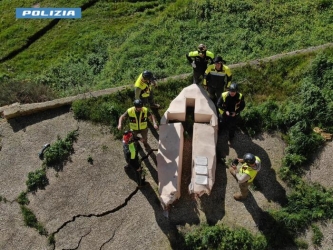In one of the most tense moments regarding immigration, the tenth anniversary of the largest migrant disaster in the Mediterranean has arrived.
On the night of October 3, 2013, a boat carrying over 500 people, crammed on board, was nearing Lampedusa. To signal their position, they set a blanket on fire in front of the Conigli Island. The flames spread instantly.
It was a catastrophe. 368 confirmed migrant casualties. 155, including 6 women and 2 children, were saved. It was a tragedy that could not be ignored, one in which people could not turn away, close their eyes, or forget the dead at the bottom of the Mediterranean. Because those dead, tens, hundreds, floated in front of the shores of a tormented island.
"The word shame comes to mind: it is a shame! Let us join our efforts so that such tragedies do not happen again," declared Pope Francis on that very day. However, the count of the dead has never ceased.
Because from that day until today, in ten years, the number of migrants who have died in the Mediterranean in an attempt to reach Europe leaves one speechless.
28 thousand dead in 10 years. Over 28,000 individuals, either deceased or missing.
Of these, a staggering 1,143 were minors, often tiny children cradled in the arms of desperate mothers seeking to save them from hunger, wars, and persecutions.
In 2023 alone, the number of minors who died or went missing in the Mediterranean exceeded 100, accounting for 4% of the total—a percentage that has dramatically increased since 2014 when it was less than 1%. These figures come from Save the Children, which calls for a European search and rescue system to save those in distress at sea. From 2014 until now, over 112,000 unaccompanied minors have arrived in Italy by sea. This year, from January 1st, there are more than 11,600 minors who arrived by sea without any reference to adult figures.
In these ten years, about a million people have taken to the sea to reach Europe, mainly departing from Libya and Tunisia.
The massacre continues and so do the controversies. In recent years, with right-wing parties in power, the issue has been framed in populist terms. Much has been said about invasion. And the words of Minister of the Interior, Matteo Piantedosi, the day after another major tragedy, the one in Cutro, Calabria, with almost a hundred victims, still linger in memory: "I wouldn't leave if I were desperate because I was raised with the responsibility not to ask myself what I should ask of the place where I live, but what I can do for the country I live in for its redemption." As if he were attributing blame to migrants.
The anniversary of the tragedy comes at a very tense moment, after the latest decree from the Meloni Government, disputes with France and Germany, and the ruling of the Catania court.

 Sezioni
Sezioni
















